Top 5 Crowdsourced Testing Companies in 2025
With constant releases, testing on multiple devices, and users scattered across the globe, internal teams alone can fall short. To address these issues, companies are increasingly resorting to crowdsourced testing.

According to a 2025 study, the crowdsourcing software market was valued at $2.37 billion in 2023 and is projected to reach $6.91 billion by 2031.
This raises the question: What makes it grow so rapidly in a world already populated with platforms, developers, AI tools, and digital talent? The answer lies in its unique ability to decentralize innovation, scale problem-solving, and tap into global expertise.
When testing involves an enormous scope that requires multiple platforms, user bases, and environments, crowdsource testing is the way to go. However, there is a caveat: While crowdtesting is a beneficial service, partnering with an unreliable vendor can have the opposite effect, impacting delivery and even compromising user data.
Although crowdtesting as a service has matured over the years, even today, only a handful of vendors are truly capable and up to the task.
This guide compares the best crowdsourced testing companies based on factors such as workflow integration, test case coverage, and niche industry. It will help the quality assurance (QA) leaders, product managers, and Engineering leads to make the right choice of their crowdsourced testing vendor.
TL;DR
- As products become increasingly complex, internal QA teams often struggle to cover all bases and address various challenges. This leads to a need for crowdsourced testing.
- While crowdsourced testing has matured, not all vendors are equally capable of delivering effective results.
- This guide provides the reader with a comparison of different vendors, helping them choose the best option for their specific use case.
Let’s dive into it!
Table of Contents
- Evaluation Criteria for Crowdsourced Testing Companies
- Top 5 Crowdsourced Testing Companies
- Choosing the Right Crowdsourced Testing Company
Evaluation Criteria for Crowdsourced Testing Companies
You might think the more testers and devices a provider boasts, the better. However, this rarely reflects the actual quality of their testing. The number of testers or devices is insufficient to determine if a vendor is suited for a particular client’s needs.
This limited information ignores factors such as tester expertise, the effectiveness of test case execution, the quality of bug reporting, or the vendor’s ability to manage testers in a structured manner.
What matters in enterprise testing is ensuring product quality, an efficient feedback loop, and seamless integration into the client product’s workflows.
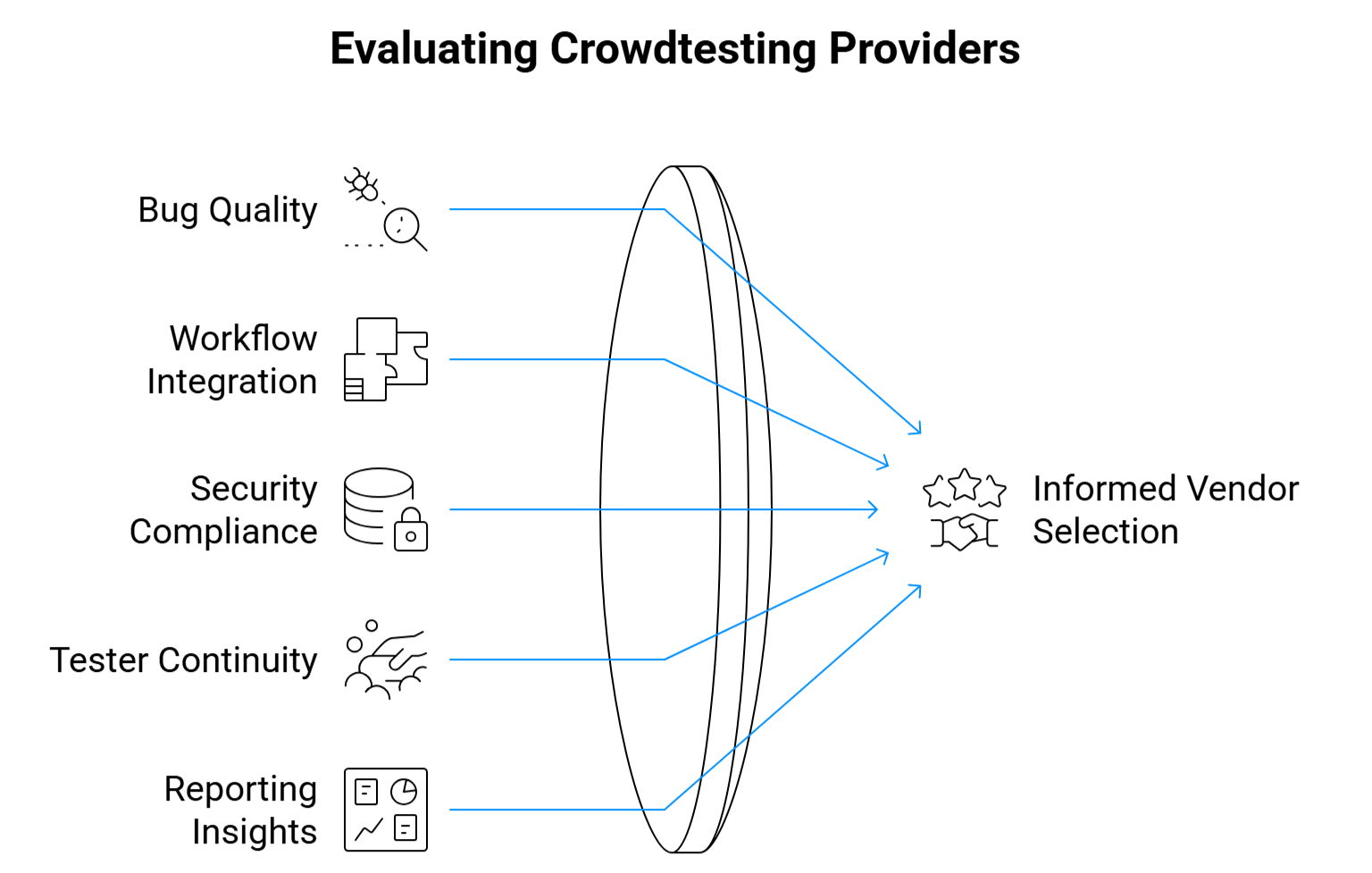
These criteria can be evaluated using several factors, which we’ll discuss below.
1. Quality of bug reproduction and triage
According to research conducted in 2025, duplicates account for 42% of all bug reports in a bug tracking system, resulting in considerable maintenance overhead.
When selecting a crowdsourced testing vendor, it is essential to assess the quality of the bugs and bug reports. The team should be capable of identifying bugs related to local user experience, such as local language and payment methods.
Their bug reports should be detailed and provide clear, reproducible steps, environment context, logs, video recordings, API endpoints, etc. This helps in triaging the problem and resolving it promptly. The triage process should also ensure there are no duplicate bugs.
2. Workflow and toolchain integration
Ensure that the vendor can smoothly integrate into the company’s existing workflows. This involves integrating with workflows such as JIRA and GitHub, as well as integrating with the CI/CD pipeline. This results in a more efficient testing process, as both teams have real-time visibility into pipeline runs, ticket statuses, and other relevant information.
3. Security, privacy, and compliance capabilities
A crowdtesting company must ensure that it complies with all security requirements and compliance laws, as crowdtesting involves testing at scale with large amounts of data. This includes complying with laws such as SOC 2 and GDPR, among others.
The testing environments should be secure, with a proper access management mechanism in place, and testers must sign a Non-Disclosure Agreement (NDA) if the data is sensitive.
Imagine a fintech company needs to check a new mobile app. In that case, this fintech company is more likely to partner with a cybersecurity company to ensure its testing program aligns with the PCI DSS, SOC 2, and ISO 27001 frameworks.
4. Tester coverage and execution continuity
A reliable vendor should assign the same testers across multiple cycles to ensure continuity. As testers become familiar with the flow, it also allows them to conduct regression and exploratory testing with a structured approach.
Consider the example of a healthcare company rolling out bi-weekly updates on its product. They would prefer to have the same batch of testers to save time, which would be spent onboarding new resources on the product every 2 weeks.
5. Reporting and insight generation
Focus on platforms that offer detailed dashboards, providing metrics such as bug trends, defect density, and test case coverage. Detailed insights and reporting help to identify areas more vulnerable to bugs and improve test coverage accordingly.
Suppose a Saas retail company is working towards a major release. They would require a vendor to provide them with real-time tracking of defects and bugs, so they can assess release readiness and make timely adjustments.
To sum it up, it is essential to recognize that there are multiple metrics to evaluate crowdtesting service providers. While a vendor might excel in one niche, their services may not be suitable for another use case.
With that information at hand, let’s review a list of top vendors, discussing their strengths and weaknesses to equip the stakeholders to make an informed decision
Top 5 Crowdsourced Testing Companies
Now it’s time to examine the available options on the market. Not all vendors are the same, and that’s what we aim to break down here. This section will provide a profile of the top 5 crowdtesting competitors, including their strengths, weaknesses, and the use cases for which they are best suited.
1. Testlio
Testlio is a company that offers managed crowdsourced testing services with a global network of testers. It provides end-to-end testing services for manual and automated workflows, including regression testing, AI testing, payments testing, accessibility testing, and usability testing.
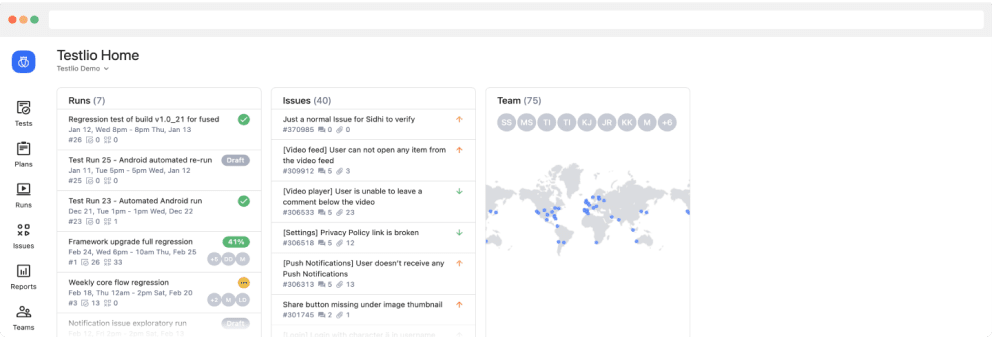
Strengths:
- Strict vetting criteria: Only 3% of applicants are assigned to client projects after a rigorous vetting process. Apart from that, each freelance tester receives a rating from 0 to 100, as well as multiple sub-ratings on performance criteria.
- Consistent testers: Testlio ensures that the same testers are available for multiple runs, while new testers are rotated periodically to provide fresh insights and perspectives.
- Compensation model: We pay testers by the hour and not per bug. This incentivizes the testers to work with liberty and engage in more thorough testing.
- Best-in-class issue management: By collaborating with clients, we help develop quality signals and workflows for every engagement to ensure issues are created, prioritized, and tracked based on impact. Each issue report also includes the steps followed, screenshots, and videos, allowing them to be reproduced and retested once a fix is deployed.
- Unmatched Coverage: Testlio’s crowdsourced testing platform supports 20+ testing types and connects teams to 600k+ devices, 800+ payments, and testers in 150+ countries, speaking 100+ languages to deliver the coverage that great digital experiences demand.
- Seamless integrations: The Testlio platform is designed to fit into existing product workflows, seamlessly integrating with critical DevOps tools and enabling smoother collaboration, faster feedback loops, and clear communication across distributed teams.
- Enterprise-grade security: Testlio is ISO/IEC 27001:2022 certified, with rigorous data governance built into every engagement, so client data stays protected, structured, and fully compliant.
Limitations:
- Higher cost: Testlio’s services are fully managed, and the prices are customized to each project. While affordable for enterprises, it might not be the most economical option for startups.
Suitable use case:
- Enterprise QA teams with structured QA cycles.
- Applications under frequent iterations.
- Products geared towards e-commerce, retail, and finance.
- Global products that support localized experiences.
- Notable customers include eBay, PayPal, etc.
2. Global App Testing (GAT)
Global App Testing is a crowdsourced testing solution provider with a network of 80,000 testers worldwide. GAT is primarily focused on functional and user experience (UX) testing, specializing in integrating test cases into existing workflows.
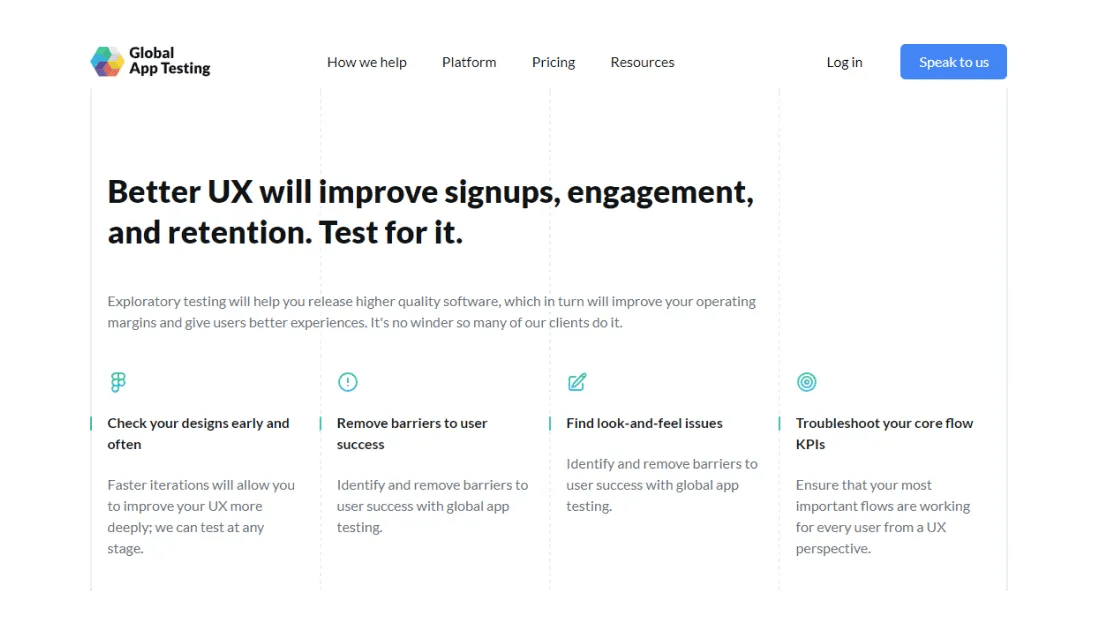
Strengths:
- Integration Options: GAT supports integrations with multiple tools, such as JIRA, GitHub, and TestRail, which allow for better visibility of test runs and results. Additionally, GAT features a REST API that can be utilized to integrate it into existing workflows, allowing access to result runs within an existing test suite.
- Wide range of testing capabilities: It offers a comprehensive suite of testing options, including functional bug testing, usability issues, and provides support to ensure a consistent look and feel. Apart from that, they offer several add-on services such as benchmarking, accessibility testing, etc.
- Swift result delivery: The platform generates, compiles, and shares results for test suites within 6 hours.
Limitations:
- Lack of tester consistency: The work model adopted by GAT means that the same testers might not always be available for test execution, as mentioned in one of their reviews.
- Process overhead: Some clients complain about additional steps for specific processes that tend to be a nuisance, i.e., a manual sign-off required, which prevents access on weekends.
Suitable use cases:
- Teams are launching international products that support bilingual features.
- Regression or smoke testing on real devices in specific markets.
- Industries: IOT, fintech, travel.
3. Rainforest QA
Rainforest QA is a service provider that utilizes AI-assisted, no-code tools for test execution, followed by a layer of human verification.
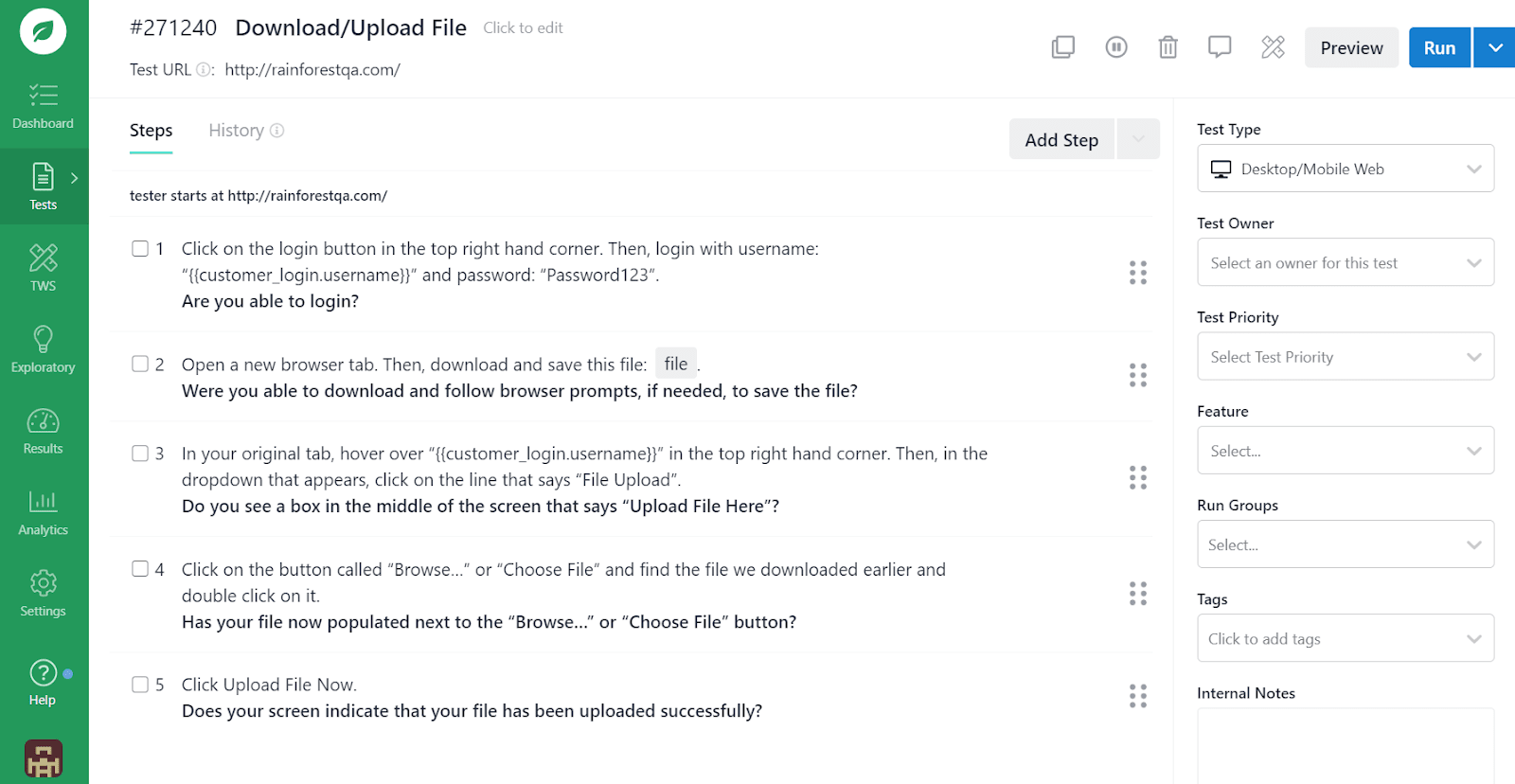
Strengths:
- Virtual Machines: Their test execution is entirely on virtual machines, which eliminates limitations related to device maintenance.
- Integration Options: They provide and support multiple integration options such as Slack, JIRA, CircleCI, etc.
- Self-healing tests: The tool uses AI to employ self-healing tests, which automatically adjust to changes in the environment.
Limitations:
- Reliability of AI features: Although the product is stable, some users complain that the AI features are not yet fully reliable. For example, sometimes it attempts to overwrite a test step, but it ends up breaking the test for future runs.
- Absence of real devices: It is not suitable for use cases that are heavily reliant on real end-user devices.
Suitable use cases:
- Startups and medium-sized companies.
- Agile development teams.
4. Test IO
TestIO is a testing platform comprising a vetted network of testers worldwide. It provides managed testing services as well as professional crowdtesting services.
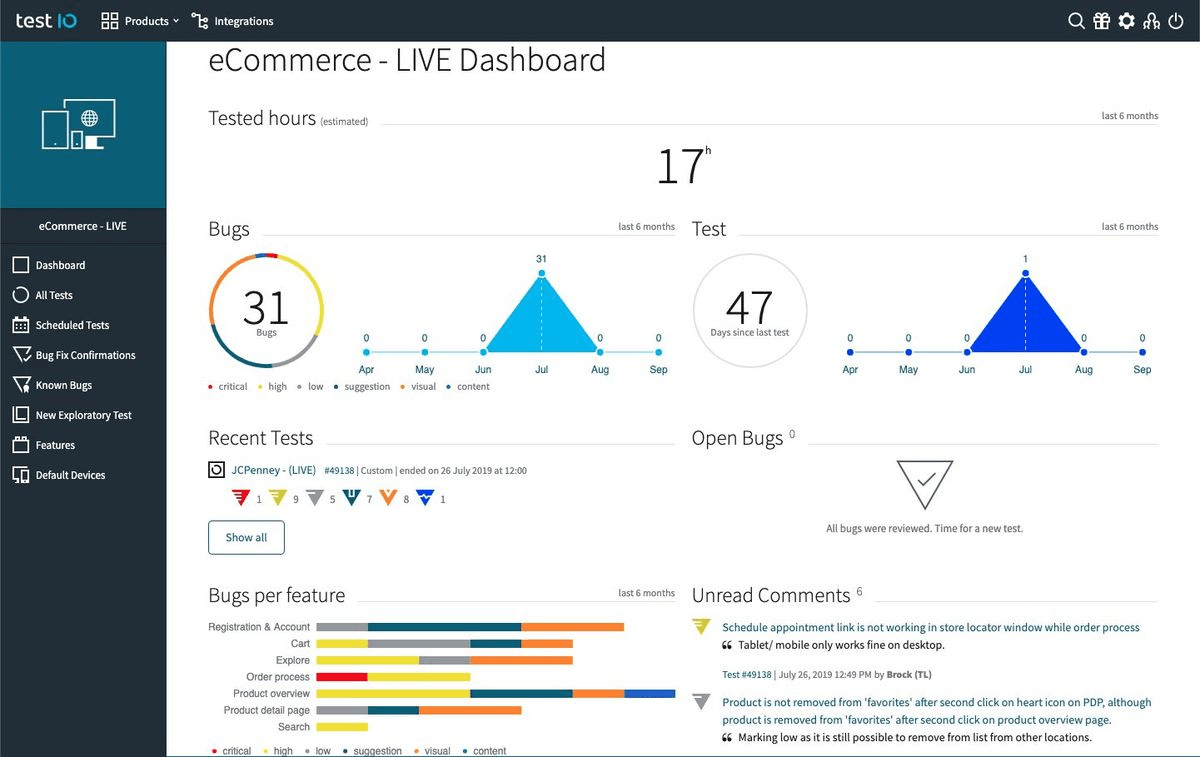
Strengths:
- Detailed bug reporting: TestIO reports are intuitive and also integrate relevant video recordings in the form of screencasts. They also provide the option of direct communication with the bug reporting testers to answer any queries.
- Prompt bug-fix confirmation: Software fixes are verified within 30 minutes, and the confirmation can be dispatched through the tool of the client’s choice.
- Emphasis on security: Testers sign non-disclosure agreements (NDAs) with Test IO as well as the clients to control trusted access, according to their crowdtesting platform.
Limitations:
- Limited Malleability: The testing process can only be customized to a limited extent. At times, test cases need to be adjusted to integrate with the tool.
- Minor latency in web portal: The web portal can be unresponsive at times, although it is not that frequent.
Suitable use cases:
- E-commerce, entertainment, and digital education applications.
- Customers: Soundcloud, Codecademy.
5. TestBirds
TestBirds is a Munich-based crowd testing provider that specializes in usability and localized testing. Their work model emphasizes ensuring compliance with security protocols.
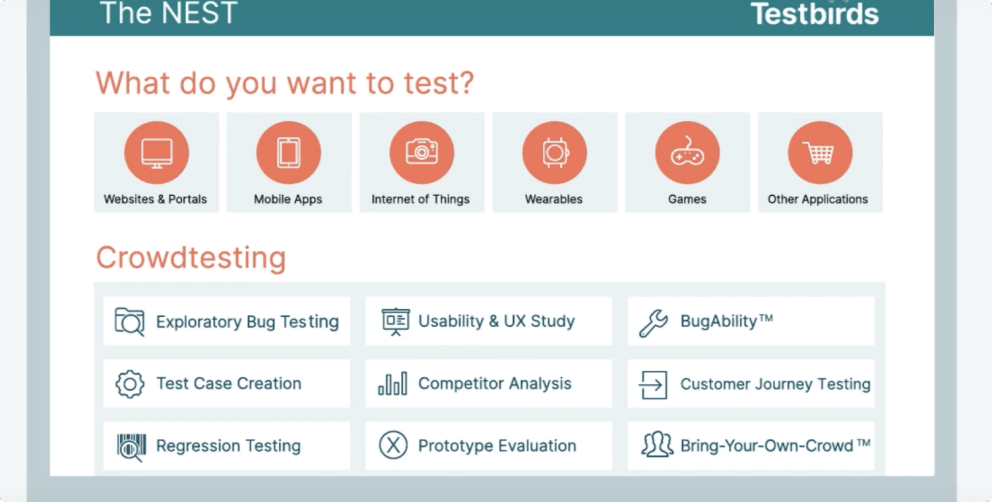
Strengths:
- Emphasis on user experience: They offer detailed feedback on the usability of a product, in addition to functional testing.
- Security certifications: The company is ISO 27001:2022 certified, making it eligible to handle sensitive data.
- Department-specific services: They offer testing services designed to address specific bottlenecks for each department.
Limitations:
- Limited availability of testers in geo-specific locations.
- The technical support team’s response time can be improved.
Best use case:
- Usability-focused testing.
- Regulated industries such as finance and healthcare.
The table below presents a grid format comparison of the crowdsourced testing companies discussed above.
| Vendors | Strengths | Limitations | Best Use Case |
| Testlio | Highly vetted testers, consistent assignments, and an hourly compensation model | High cost, not the best option for startups | Enterprise apps need global structured QA and continuity |
| Global App Testing (GAT) | Fast results (6 hrs), wide test coverage, tool integrations (JIRA, GitHub, etc.) | Tester inconsistency, manual process overheads | Global product launches, regional regression testing |
| Rainforest QA | No-code platform, AI-assisted testing, CI/CD integrations | Unreliable AI features, lacks real device testing | Agile teams need quick, no-code regression checks |
| Test IO | Detailed bug reports, fast bug confirmation, and NDA-backed security | Limited customization, occasional portal lag | E-commerce, media, and consumer app UX testing |
| Testbirds | Strong in usability/localization, ISO 27001 certified, department-specific QA | Geo-specific tester gaps, slower support response | Usability and multilingual app testing in regulated sectors |
Now that we have discussed the top 5 crowdtesting vendors in the market, it is important to recall that selecting the right vendor depends on your particular needs and goes beyond mere optics.
Choosing the Right Crowdsourced Testing Company
As we discussed at the beginning of this article, you should never evaluate crowdsourced testing companies solely based on vanity metrics, such as the number of testers and devices. While yes, in some instances, these are important factors, it is vital to evaluate how the vendor aligns with your testing goals.
For example, a company operating in Europe would seek a crowdtesting vendor who is GDPR-compliant and follows strict data-handling protocols. A regular crowdtesting service may not fulfill that requirement.
The point being, teams need to evaluate outcomes rather than optics to gain long-term benefits from crowdtesting. This means that if a company seeks consistent tester availability over multiple sprints, Testlio might be a suitable option for them.
The main takeaway from this discussion is that a vendor for crowdtesting must align with your testing goals. To make an informed decision, it is necessary to evaluate how a vendor will support your QA strategy, including product complexity and release velocity.
Testlio can connect you to a team of competent testers across the globe to start working on your crowdsourced testing goals. Contact our sales team to learn more!
